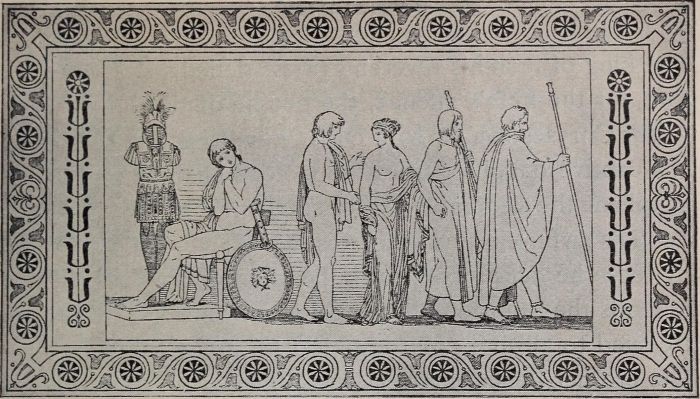The Iliad Book 5 Summary sets the stage for this enthralling narrative, offering readers a glimpse into a story that is rich in detail and brimming with originality from the outset. This chapter introduces us to the pivotal battle between Diomedes and Ares, a clash that would forever alter the course of the Trojan War.
As the battle rages on, Homer delves into the complexities of human nature, exploring themes of courage, hubris, and divine intervention. Through vivid descriptions and skillful use of literary devices, Book 5 provides a captivating account of the Trojan War, leaving an indelible mark on the reader’s imagination.
Key Events in Book 5 of The Iliad
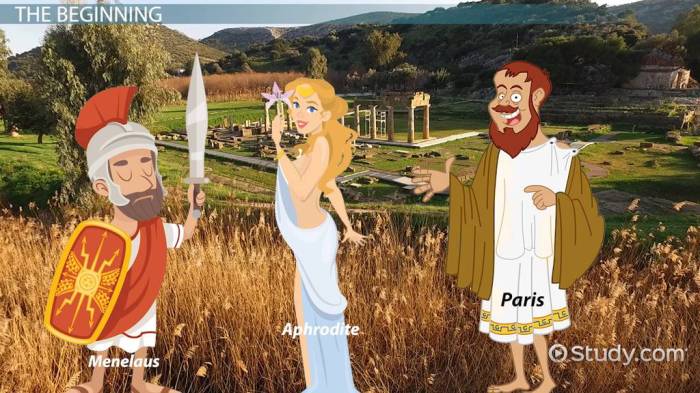
Book 5 of The Iliad is marked by several pivotal events that escalate the conflict between the Greeks and Trojans. One of the most significant is the battle between Diomedes and the war god Ares.
The Battle between Diomedes and Ares
The battle ensues after Diomedes, emboldened by Athena’s support, charges into the fray and wounds the Trojan hero Pandarus. Enraged, Ares intervenes, assuming the guise of a mortal and joining the Trojan ranks. However, Athena, who is aiding the Greeks, recognizes Ares’s presence and warns Diomedes.
The Iliad Book 5 summary reveals the intense battle between the Greeks and Trojans. Amidst the chaos, Diomedes emerges as a fierce warrior. While he’s at it, you might find the stats for the Oxygen vs The Boys match intriguing.
The game was a thrilling showdown, and you can check out the detailed stats here . Returning to the Iliad Book 5 summary, the battle rages on, with Diomedes continuing to prove his mettle.
With Athena’s guidance, Diomedes confronts Ares and strikes him with a spear. Ares, wounded, flees to Olympus, where he complains to Zeus about the interference of the gods. Zeus rebukes Ares, reminding him that he cannot interfere in the conflict.
Athena’s Intervention
Athena’s involvement in the battle is crucial. She not only warns Diomedes of Ares’s presence but also empowers him with divine strength and courage. This intervention highlights the role of the gods in shaping the course of the war, as they favor different sides and influence the outcome of battles.
Character Development and Symbolism: The Iliad Book 5 Summary
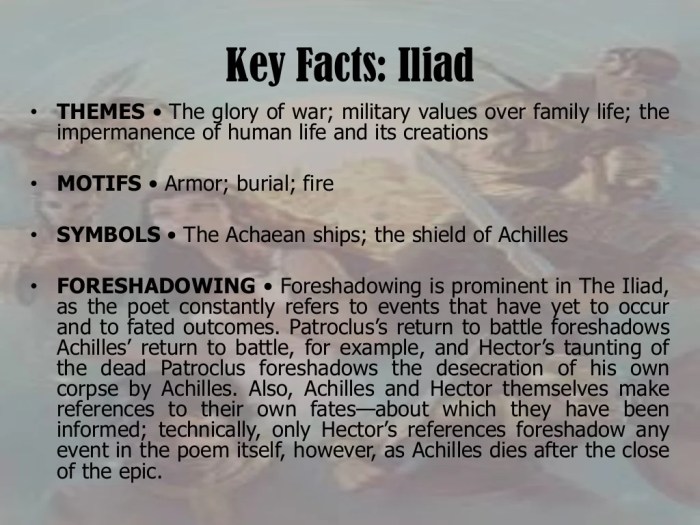
The fifth book of the Iliad presents significant character development and employs rich symbolism to enhance the narrative. Two prominent figures, Diomedes and Ares, undergo profound transformations, while Athena emerges as a guiding force, shaping the course of the battle.
Diomedes’ Transformation, The iliad book 5 summary
Initially depicted as a formidable warrior, Diomedes’ character undergoes a remarkable metamorphosis in Book 5. Empowered by Athena’s divine guidance, he emerges as a force to be reckoned with. His boldness and audacity lead him to challenge the gods themselves, culminating in his confrontation with Ares.
Diomedes’ transformation symbolizes the potential for human greatness when guided by divine inspiration. His unwavering determination and ability to overcome seemingly insurmountable obstacles serve as a testament to the power of human resilience and the transformative potential of divine intervention.
Ares’ Portrayal as the God of War
Ares, the embodiment of war’s destructive fury, is a central figure in Book 5. His portrayal as a relentless and indiscriminate force of chaos underscores the horrors and brutality of warfare.
Ares’ presence on the battlefield symbolizes the dehumanizing effects of war. His disregard for human life and his unyielding pursuit of carnage serve as a stark reminder of the destructive consequences that can arise from unchecked aggression.
Athena’s Role as Mentor and Protector
Athena, the goddess of wisdom and war, plays a crucial role in Diomedes’ transformation. As his mentor and protector, she guides him with strategic advice and shields him from harm.
Athena’s presence in the narrative symbolizes the importance of wisdom and guidance in the face of adversity. Her unwavering support for Diomedes demonstrates the power of divine protection and the transformative potential of mentorship.
Themes and Literary Devices
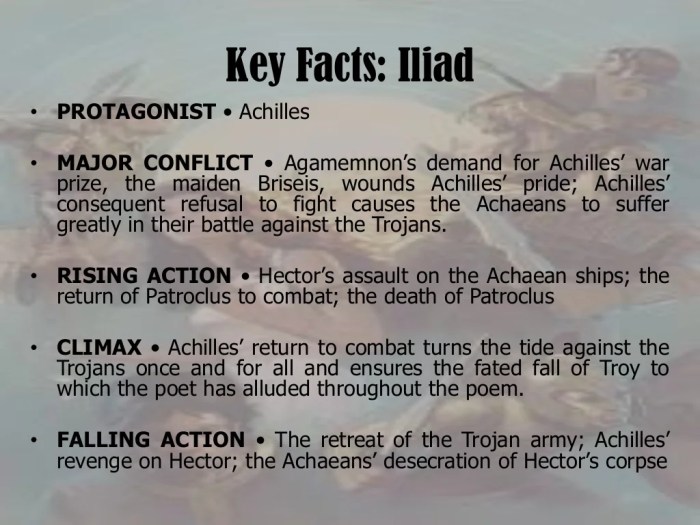
Homer explores several major themes in Book 5 of the Iliad.*Courage is a central theme, as the Achaeans and Trojans engage in fierce battles. The bravery of warriors like Diomedes and Hector is highlighted, while the cowardice of others is exposed.Hubris,
or excessive pride, is another significant theme. The actions of Diomedes, who challenges the gods themselves, exemplify hubris. The consequences of his arrogance are foreshadowed, building suspense and tension.Divine intervention plays a crucial role in Book 5. The gods take sides in the conflict, influencing the outcome of battles.
Athena aids the Achaeans, while Ares supports the Trojans. The involvement of the gods adds an element of the supernatural to the narrative.Homer uses
- *similes and
- *metaphors to enhance the vividness and impact of his storytelling. Similes compare two unlike things, using “like” or “as.” For example, Diomedes is described as “like a ravening lion.” Metaphors make a direct comparison without using “like” or “as.” For example, Athena’s eyes are said to “flash fire.”
Foreshadowing and*dramatic irony are also used to build suspense. Foreshadowing hints at future events, creating a sense of anticipation. For example, Diomedes’s challenge to the gods foreshadows his eventual downfall. Dramatic irony occurs when the audience knows something that the characters do not.
For example, the reader knows that Diomedes will face divine retribution for his hubris.
Historical and Cultural Context
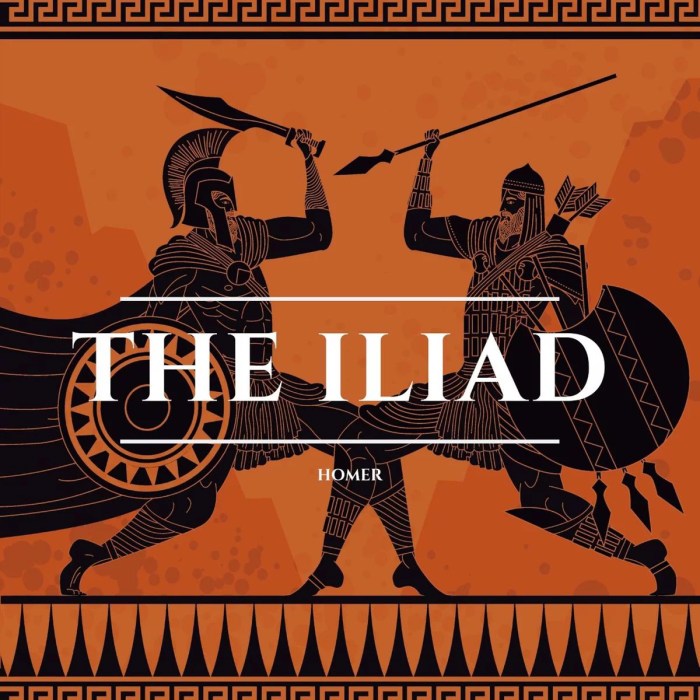
The Trojan War, the backdrop of The Iliad, is steeped in historical and mythological significance. The conflict, rooted in Greek mythology, involved the Achaeans (Greeks) laying siege to the city of Troy, triggered by the abduction of Helen, the wife of Menelaus, by the Trojan prince Paris.
The battle between Diomedes and Ares in Book 5 holds immense mythological importance. Ares, the god of war, represents the destructive and chaotic aspects of conflict, while Diomedes, a mortal hero, embodies human courage and determination. Their clash symbolizes the struggle between the divine and mortal realms, and the potential for mortals to challenge even the gods.
Impact on the Narrative
Book 5 serves as a pivotal turning point in The Iliad’s narrative. Diomedes’ triumph over Ares weakens the Trojan forces and boosts Achaean morale. The battle also foreshadows the eventual Achaean victory, as it demonstrates the vulnerability of the gods and the power of mortal heroes.
Common Queries
What is the main event of Book 5 of The Iliad?
The main event of Book 5 is the battle between Diomedes and Ares, the god of war.
Who intervenes in the battle between Diomedes and Ares?
Athena, the goddess of wisdom and war, intervenes in the battle to protect Diomedes.
What is the significance of the battle between Diomedes and Ares?
The battle between Diomedes and Ares is significant because it shows that mortals can stand up to the gods and even defeat them.
